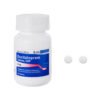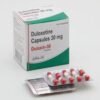What is venlafaxine?
Get now
- Effective for Depression: venlafaxine is commonly prescribed for major depressive disorder and has shown significant efficacy in alleviating symptoms.
- Anxiety Relief: Venlafaxine is also effective in treating generalized anxiety disorder (GAD) and social anxiety disorder, helping reduce anxiety symptoms.
- Improved Mood: Many users report a noticeable improvement in overall mood and well-being.
- Dual Mechanism of Action: By affecting both serotonin and norepinephrine levels, it may provide a broader therapeutic effect compared to some other antidepressants.
- Favorable for Certain Patients: Some individuals who do not respond well to selective serotonin reuptake inhibitors (SSRIs) may find venlafaxine more beneficial.
- Extended Release Formulation: The extended-release version allows for once-daily dosing, which can enhance adherence to the treatment regimen.
- Potential for Chronic Pain Management: Some studies suggest it may help with chronic pain conditions, particularly in patients with fibromyalgia or neuropathic pain
Introduction
Venlafaxine, commonly marketed under the brand name Effexor, is an antidepressant medication primarily used to treat major depressive disorder (MDD), generalized anxiety disorder (GAD), and panic disorder. As a serotonin-norepinephrine reuptake inhibitor (SNRI), it works by balancing chemicals in the brain that affect mood and emotional state.
How Venlafaxine Works
Venlafaxine inhibits the reuptake of two key neurotransmitters: serotonin and norepinephrine. By preventing their reabsorption in the brain, it increases the levels of these neurotransmitters. Which can help alleviate symptoms of depression and anxiety. Unlike some other antidepressants, venlafaxine has a unique dose-dependent mechanism; at lower doses. It primarily targets serotonin receptors, while at higher doses. It also affects norepinephrine.
Indications:
- Major Depressive Disorder (MDD): Venlafaxine is effective in reducing depressive symptoms, improving mood, and enhancing overall well-being.
- Generalized Anxiety Disorder (GAD): It helps manage persistent anxiety and associated symptoms, providing relief for those with chronic worry.
- Panic Disorder: Venlafaxine can reduce the frequency and intensity of panic attacks.
Benefits of Venlafaxine:
- Dual Action: By targeting both serotonin and norepinephrine. IT can be particularly effective for individuals who may not respond to traditional SSRIs (selective serotonin reuptake inhibitors).
- Rapid Onset: Some patients report improvements in symptoms within a few weeks of starting treatment.
- Versatility: In addition to its primary uses, venlafaxine is sometimes prescribed off-label for conditions such as social anxiety disorder. Post-traumatic stress disorder (PTSD), and neuropathic pain.
Side Effects:
While venlafaxine can be highly effective. It also comes with potential side effects. Common ones include:
- Nausea
- Dizziness
- Sleep disturbances
- Dry mouth
- Increased blood pressure (especially at higher doses)
In some cases, discontinuation of can lead to withdrawal symptoms. It’s important to taper the dosage under a doctor’s guidance.
Considerations and Precautions:
- Medical History: Before starting , it’s crucial to discuss your complete medical history with a healthcare provider. particularly any history of heart disease, high blood pressure, or bipolar disorder.



